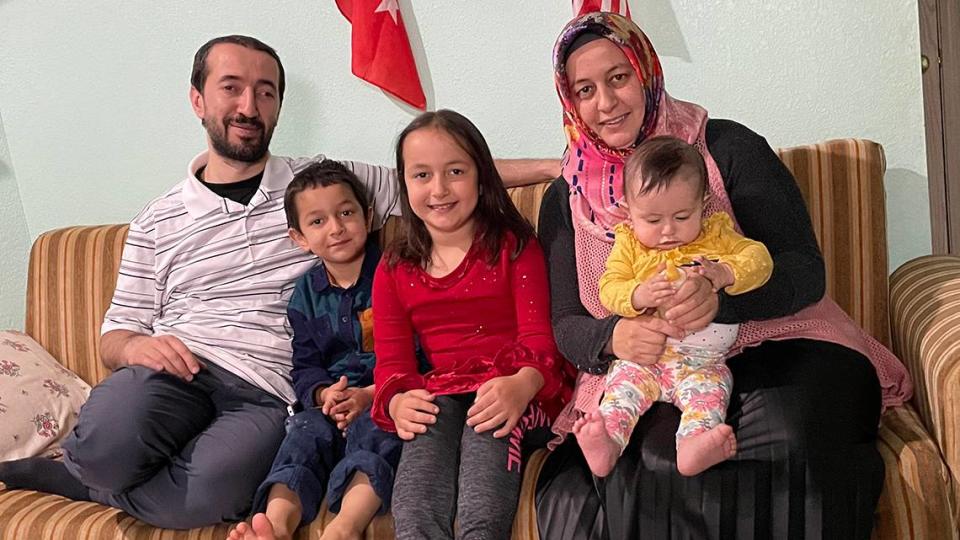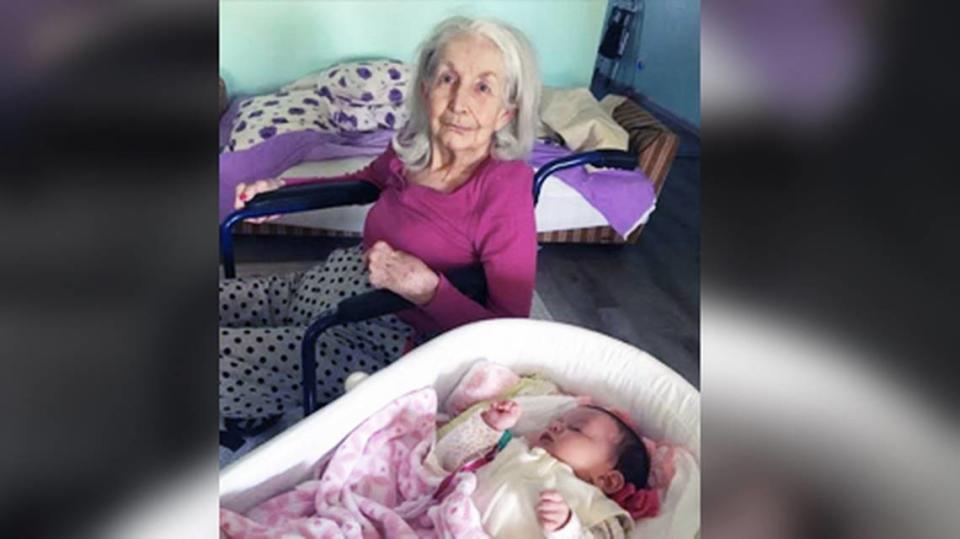‘Who would take care of this aunt?’ Turkish immigrants take in dying KC social worker
It was at an Eid al-Fitr dinner — the “breaking the fast” celebration at the end of Ramadan — four years ago that Benjamin and Ayşe Nur Öztekin Murat met the woman they came to think of as their American aunt, Delores Jankovich.
I can only know Delores, who died in February at age 83, through her Facebook page, where she posted about Freddie Gray, white supremacy, kids in cages and Joe Biden’s rescue dog.
But it’s plain that this former Kansas farm girl and longtime prison social worker loved Ruth Bader Ginsburg, sunsets, Edward Steichen and voting rights. Also Pope Francis, AOC, Johnny Cash and the Murats, the Turkish immigrants who took her in for two long stretches in her final year, and cared for her right up until 10 days before her death.
She did have family — a son with serious health problems, and a brother with both cancer and COVID-19 — as well as many friends. But it’s no longer common, if it ever was, for those of us who were born here to do what the Murats did.
And on the day that I’ve been reading about Biden’s unfortunate decision not to close the Trump-era Homeland Security office that was created to highlight the relatively few, and often highly sensationalized, crimes committed by immigrants, I’d like to highlight this quiet love story between an older American Christian and the young Muslim family who invited her to share their two-bedroom townhome near Arrowhead Stadium.

‘She was feeling her grandma emotions’
Even that first night they met, says Benjamin, a school counselor, “the kids were playing with her and they connected. She’s never been a grandma, and I believe she was feeling her grandma emotions, and we were feeling the same way,” with all the elders in their family back in Turkey. “She was sent by God to fill our family gaps.”
After she had to have surgery on her foot last year, the Murats visited her at the University of Kansas Medical Center and found her upset that she was being discharged but still couldn’t walk.
“Who would take care of this aunt?” Benjamin wondered. “It was an unforgettable moment in our lives. We said to each other that we cannot leave this lady by herself in this state. It does not suit us; the reason for our life is to make sacrifices for others. We said yes to each other and shared our thought to our aunt. I will never forget, her eyes filled with tears, she asked repeatedly whether we were joking or not, to see if we were sincere.”

For the next three months, she slept on the sofa in their living room, since she couldn’t get up the stairs, and called up to them if she needed to get up in the night. Yet to Benjamin, these were “days like dreams, reading books to children before going to bed, cooking baklava together, having dinner every day, eating together.” No other American had let them in like this, he said.
A physical therapist came three times a week, and when Delores felt well enough to want her independence back, “we moved her to a new apartment.” But one day when they were bringing dinner to her there, “we knocked and no one was responding. … We were praying frantically and called the firemen,” who when they got in found that she had fallen.
They all cried with relief that she wasn’t seriously hurt, but soon she fell again — four more times, in fact. The last time, in November, she broke four ribs and had to be hospitalized.
Even with a newborn, they welcomed her to their home
This was right around the time the Murats’ youngest daughter Merve was born, “healthy like a light ball,” her dad says, on Nov. 10. Two weeks later, Delores asked if she could move back in.

With a new baby, their 4-year-old and 8-year-old attending different online schools and Benjamin working mostly at home, too, could they swing it?
“It was difficult,” Ayşe Nur said, “because I just gave birth. I’m thinking, ‘Can I handle it?’ But in our culture, your parents are with you until they die.”
So they said yes, and for the next nearly three months, cared for her in a more intense way.
Their Turkish neighbors brought in meals, and “my wife and our neighbors were meeting the personal needs of our Aunt Delores, helping her to eat and change her clothes,” Benjamin said. “But things are getting harder, and we felt obliged to get support, so we contacted Social Services. They brought a special mattress because she slept constantly and her skin on her back was damaged. They prepared the oxygen tube for comfortable breathing.”
During these final days, “sometimes we pray together, so that our God will include her in his paradise. God reminds her of the beautiful things she has done, that she helped people and that these beautiful things will repay her.”
At the very end of her life, she needed more quiet than they could give her, and went to stay with another friend. Losing her was wrenching for the Murats, but they continue to thank the God who can turn “a relationship that begins with a small dinner” into a family.
I thank God, too, for humans like the Murats, who when I visited them insisted on feeding me a gorgeous plate of cig kofte that they could not even share because they were still fasting for Ramadan. (“You really ate while they couldn’t eat?” asked my husband. You know, I did, and not only because to have done otherwise would have been rude.)
Nothing makes me feel more like waving an American flag than when we live up to that Emma Lazarus poem on the Statue of Liberty. “Send these, the homeless, tempest-tost, to me,” it says. Send the persecuted to us, the “Mother of Exiles.”
But that’s not a completely unselfish impulse, either. Because like the Murats, who took the oath of citizenship two years ago, the “tempest-tost” tend to make great Americans.


 Yahoo Movies
Yahoo Movies 